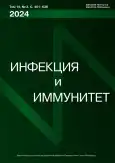Экспрессия PD-1 И Tim-3 различными субпопуляциями моноцитов при хронической часто рецидивирующей герпесвирусной инфекции
- Авторы: Ращупкин И.М.1, Меледина И.В.1, Котова М.А.1, Желтова О.И.1
-
Учреждения:
- ФГБНУ Научно-исследовательский институт фундаментальной и клинической иммунологии
- Выпуск: Том 14, № 3 (2024)
- Страницы: 575-580
- Раздел: КРАТКИЕ СООБЩЕНИЯ
- URL: https://journal-vniispk.ru/2220-7619/article/view/262083
- DOI: https://doi.org/10.15789/2220-7619-PAT-16807
- ID: 262083
Цитировать
Полный текст
Аннотация
Более половины населения Земли инфицированы вирусом простого герпеса. В большинстве случаев инфицирование не сопровождается симптомами, однако у некоторых людей заболевание протекает в форме хронической инфекции с частыми и тяжелыми рецидивами. Одной из наиболее вероятных причин этого может быть нарушение иммунной регуляции. В последние годы активно изучается роль ингибиторных сигнальных молекул, в частности, PD-1 и Tim-3, в регуляции иммунного ответа и функций иммунокомпетентных клеток. Ранее было показано, что активация сигнальных молекул на Т-клетках подавляет иммунный ответ. Помимо Т-лимфоцитов, PD-1 и Tim-3 экспрессируются также на других иммунных клетках, в частности, моноцитах. Исследование экспрессии данных молекул моноцитами при хронических вирусных инфекциях, однако ранее не проводилось. Целью данного исследования явилось изучение субпопуляционного состава моноцитов и уровня экспрессии PD-1 и Tim-3 на различных популяциях моноцитов у больных с хронической часто рецидивирующей герпесвирусной инфекцией. В исследование было рекрутировано 26 пациентов. Все пациенты получили курс противовирусной и иммуномодулирующей терапии в условиях иммунологичес кого отделения клиники иммунопатологии. Количество классических, промежуточных и неклассических моноцитов, а также экспрессия на моноцитах PD-1 и Tim-3 оценивались методом проточной цитофлюориметрии до и после проведения курса терапии. Моноциты выделяли из периферической крови, субпопуляции разделяли по уровню экспрессии CD14 и CD16. У больных герпесом наблюдалось сниженное в сравнении с условно-здоровыми донорами количество моноцитов, которое однако оставалось у всех пациентов в рамках референсных значений. Относительное количество PD-1-позитивных моноцитов, средняя интенсивность флюоресценции PD-1 и Tim-3, а также количество дубль-позитивных клеток было снижено у больных герпесом во всех трех исследованных субпопуляциях моноцитов. Спустя 3 месяца после проведенной терапии оценивался ответ на проведенную терапию, ответившими при этом считались пациенты, у которых за 3 месяца не регистрировалось ни одного рецидива герпеса. Ответившие пациенты отличались более низким исходным содержанием дубль-позитивных клеток среди промежуточных и неклассических моноцитов. Выявленное в настоящем исследовании снижение уровня позитивных по PD-1 и Tim-3 моноцитов при герпесвирусной инфекции может свидетельствовать о вовлечении в патогенез заболевания дефицитных по экспрессии ингибиторных сигнальных молекул моноцитов.
Ключевые слова
Полный текст
Открыть статью на сайте журналаОб авторах
Иван Михайлович Ращупкин
ФГБНУ Научно-исследовательский институт фундаментальной и клинической иммунологии
Автор, ответственный за переписку.
Email: iwwwanbets@mail.ru
лаборант-исследователь лаборатории клеточной иммунотерапии
Россия, 630099, Россия, г. Новосибирск, ул. Ядринцевская, 14И. В. Меледина
ФГБНУ Научно-исследовательский институт фундаментальной и клинической иммунологии
Email: iwwwanbets@mail.ru
кандидат медицинских наук, врач аллерголог-иммунолог, зав. отделением иммунологии клиники иммунопатологии
Россия, 630099, Россия, г. Новосибирск, ул. Ядринцевская, 14М. А. Котова
ФГБНУ Научно-исследовательский институт фундаментальной и клинической иммунологии
Email: iwwwanbets@mail.ru
врач аллерголог-иммунолог отделения иммунологии клиники иммунопатологии
Россия, 630099, Россия, г. Новосибирск, ул. Ядринцевская, 14О. И. Желтова
ФГБНУ Научно-исследовательский институт фундаментальной и клинической иммунологии
Email: iwwwanbets@mail.ru
кандидат медицинских наук, врач аллерголог-иммунолог отделения иммунологии клиники иммунопатологии
Россия, 630099, Россия, г. Новосибирск, ул. Ядринцевская, 14Список литературы
- Antonsen K.W., Hviid C.V.B., Hagensen M.K., Sorensen B.S., Moller H.J. Soluble PD-1 (sPD-1) is expressed in human macrophages. Cell. Immunol., 2021, vol. 369: 10⁴435. doi: 10.1016/j.cellimm.2021.10⁴435
- Bellner L., Thoren F., Nygren E., Liljeqvist J.-A., Karlsson A., Eriksson K. A proinflammatory peptide from herpes simplex virus type 2 glycoprotein G affects neutrophil, monocyte, and NK cell functions. J. Immunol., 2005, vol. 174, no. 4, pp. 2235–2241. doi: 10.4049/jimmunol.174.4.2235
- Das M., Zhu C., Kuchroo V.K. Tim-3 and its role in regulating anti-tumor immunity. Immunol. Rev., 2017, vol. 276, no. 1, pp. 97–111. doi: 10.1111/imr.12520
- Ghosh C., Luong G., Sun Y. A snapshot of the PD-1/PD-L1 pathway. J. Cancer, 2021, vol. 12, no. 9, pp. 2735–2746. doi: 10.7150/jca.57334
- Guglietta S., Krieg C. Phenotypic and functional heterogeneity of monocytes in health and cancer in the era of high dimensional technologies. Blood Rev., 2023, vol. 58: 101012. doi: 10.1016/j.blre.2022.101012
- Guignant C., Lepape A., Huang X., Kherouf H., Denis L., Poitevin F., Malcus C., Cheron A., Allaouchiche B., Gueyffier F., Ayala A., Monneret G., Venet F. Programmed death-1 levels correlate with increased mortality, nosocomial infection and immune dysfunctions in septic shock patients. Critical Care, 2011, vol. 15, no. 2: R99. doi: 10.1186/cc10112
- Ozanska A., Szumczak D., Rybka J. Pattern of human monocyte subpopulations in health and disease. Scand. J. Immunol., 2020, vol. 91, no. 1: e12883. doi: 10.1111/sji.12883
- Skrzeczynska-Moncznik J., Bzowska M., Loseke S., Grage-Griebenow E., Zembala M., Pryjma J. Peripheral blood CD14high CD16⁺ monocytes are main producers of IL-10. Scand. J. Immunol., 2011, vol. 67, no. 2, pp. 152–159. doi: 10.1111/j.1365-3083.2007.02051.x
- Van Wagoner N., Qushair F., Johnston C. Genital herpes infection: progress and problems. Infect. Dis. Clin. North Am., 2023, vol. 37, no. 2, pp. 351–367. doi: 10.1016/j.idc.2023.02.011
- Xia Q., Wei L., Zhang Y., Sheng J., Wu W., Zhang Y. Immune Checkpoint Receptors Tim-3 and PD-1 Regulate Monocyte and T Lymphocyte Function in Septic Patients. Mediators Inflamm., 2018, vol. 2018: 1632902. doi: 10.1155/2018/1632902
- Zhu S., Viejo-Borbolla A. Pathogenesis and virulence of herpes simplex virus. Virulence, 2021, vol. 12, no. 1, pp. 2670–2702. doi: 10.10⁸0/21505594.2021.1982373
Дополнительные файлы







